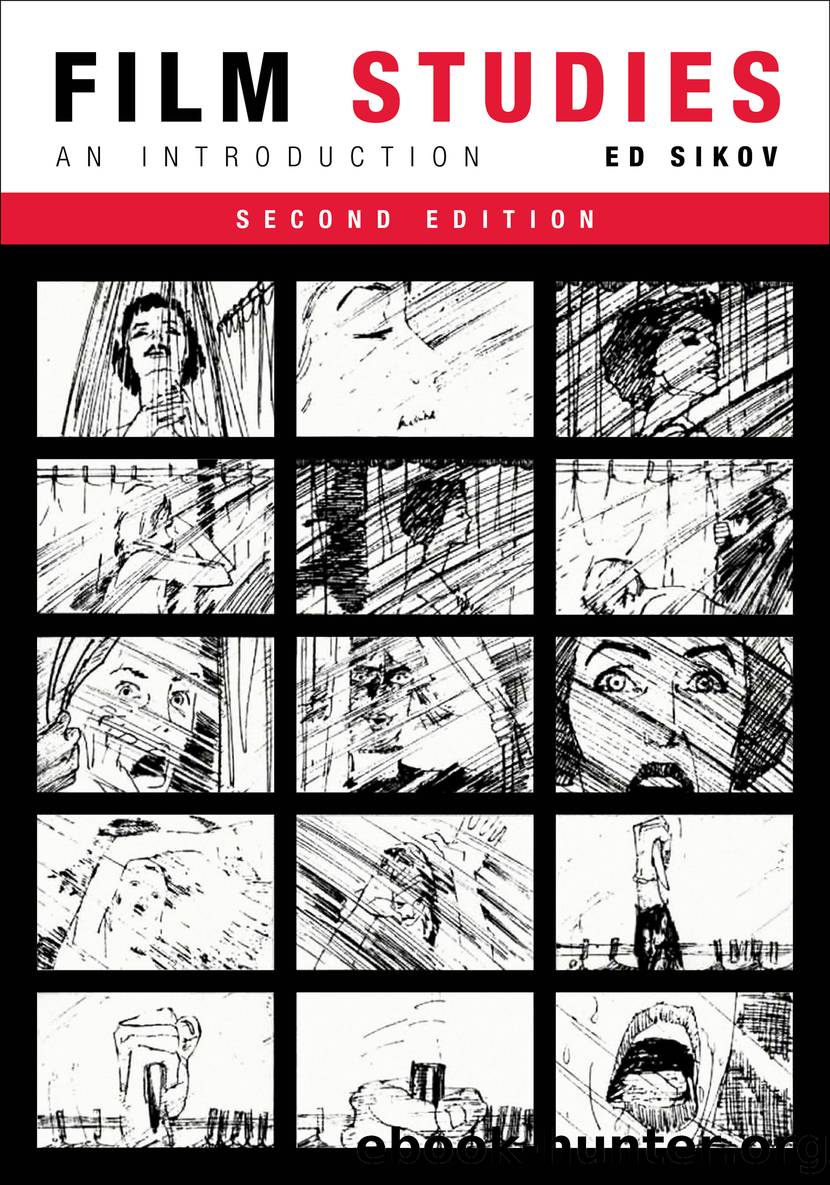Film Studies by Ed Sikov

Author:Ed Sikov
Language: eng
Format: epub
Publisher: Columbia University Press
WRITING ABOUT DIRECTORS
Unless the course you are taking is a study of one or two particular directors, you will not have the opportunity to put the auteur theory to extensive practice. Why not? Because auteurism discerns a director’s personal style from his or her entire body of work. You would have to see a fairly large number of films by Hitchcock, or Hawks, or Ford, or Spielberg, or any single director in order to be able to make any substantial claims about his or her worldview.
What you can do, however, is to learn biographical and filmographical details about the men and women whose films you are seeing and to begin to see elements of personal style in an individual film. (A filmography is a simple list or more detailed catalog of the films made by an individual; directors, producers, screenwriters, actors, and so on all have filmographies.)
To start your study of whomever you or your professor chooses, go online to the Internet Movie Database (www.imdb.com) and do a simple search for the filmmaker or film in question. Like the American Film Institute Catalog of Motion Pictures Produced in the United States, both print and online editions, imdb.com is a very useful primary resource for film scholars who are researching the names-and-dates facts of a given film’s production. Unlike the AFI Catalog, imdb.com has the virtue of being accessible from any computer in the world. The AFI Catalog print edition can be found in many college and university libraries, while the online edition is available only to subscribing individuals and institutions. (Check your library’s catalog to see whether you are able to access it.) However, one should be aware that imdb.com—like Wikipedia and other online resources—may contain factual errors despite the best intentions of those who contribute information to the site. Some professors are therefore adamant that such sites not be used for academic research; ask your professor for the guidelines for your particular course.
Let’s use as an example the pioneering female director Dorothy Arzner. Go to www.imdb.com, type the name “Dorothy Arzner” in the search box, and hit enter. The page that will appear contains her birth and death dates, the locations of her birth and death, the first lines of her IMDB biography, a few important details of her life—details that are erroneously labeled “trivia,” which actually means “insignificant matters.” (How “insignificant” is it that Arzner was the first woman to join the Directors Guild of America?) Then scroll down and find her filmography, which is itself broken down into several categories. We learn from this set of filmographies, for instance, that Arzner worked as an editor on six films and a writer on five. She worked as a director on a total of twenty films, several times in an uncredited capacity.
This page, and others like it, is only the beginning. There is a wealth of information available on imdb.com—information that would have taken previous generations of students a great deal of time, effort, and organizational skill to gather.
Download
This site does not store any files on its server. We only index and link to content provided by other sites. Please contact the content providers to delete copyright contents if any and email us, we'll remove relevant links or contents immediately.
The Kite Runner by Khaled Hosseini(4413)
Gerald's Game by Stephen King(3913)
The Perils of Being Moderately Famous by Soha Ali Khan(3781)
Dialogue by Robert McKee(3574)
Story: Substance, Structure, Style and the Principles of Screenwriting by Robert McKee(2981)
The 101 Dalmatians by Dodie Smith(2931)
The Pixar Touch by David A. Price(2735)
Confessions of a Video Vixen by Karrine Steffans(2668)
Fantastic Beasts: The Crimes of Grindelwald by J. K. Rowling(2539)
How Music Works by David Byrne(2519)
Harry Potter 4 - Harry Potter and The Goblet of Fire by J.K.Rowling(2413)
Slugfest by Reed Tucker(2411)
The Mental Game of Writing: How to Overcome Obstacles, Stay Creative and Productive, and Free Your Mind for Success by James Scott Bell(2388)
Wildflower by Drew Barrymore(2114)
Scandals of Classic Hollywood: Sex, Deviance, and Drama from the Golden Age of American Cinema by Anne Helen Petersen(2104)
Casting Might-Have-Beens: A Film by Film Directory of Actors Considered for Roles Given to Others by Mell Eila(2071)
Screenplay: The Foundations of Screenwriting by Syd Field(2051)
Robin by Dave Itzkoff(2002)
The Complete H. P. Lovecraft Reader by H.P. Lovecraft(1970)
